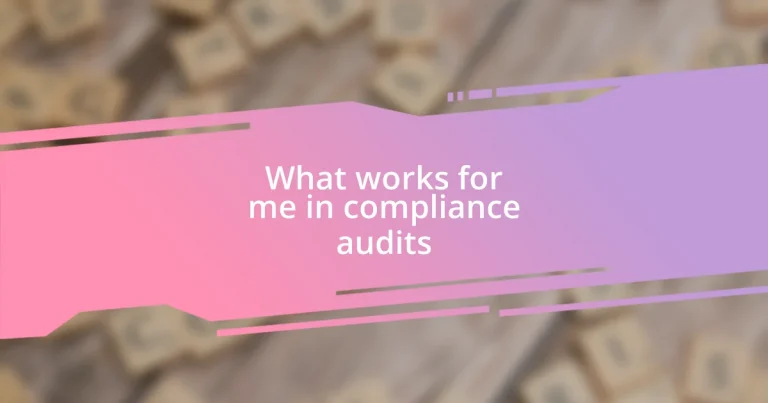Key takeaways:
- Compliance audits serve as a vital assessment tool for organizations, promoting accountability and improvement rather than merely checking boxes.
- Thorough preparation is essential for audit success, fostering confidence, enabling self-reflection, and encouraging constructive collaboration with auditors.
- Utilizing the right tools, such as cloud-based documentation and data analytics, significantly enhances the audit process by improving organization and identifying compliance trends.
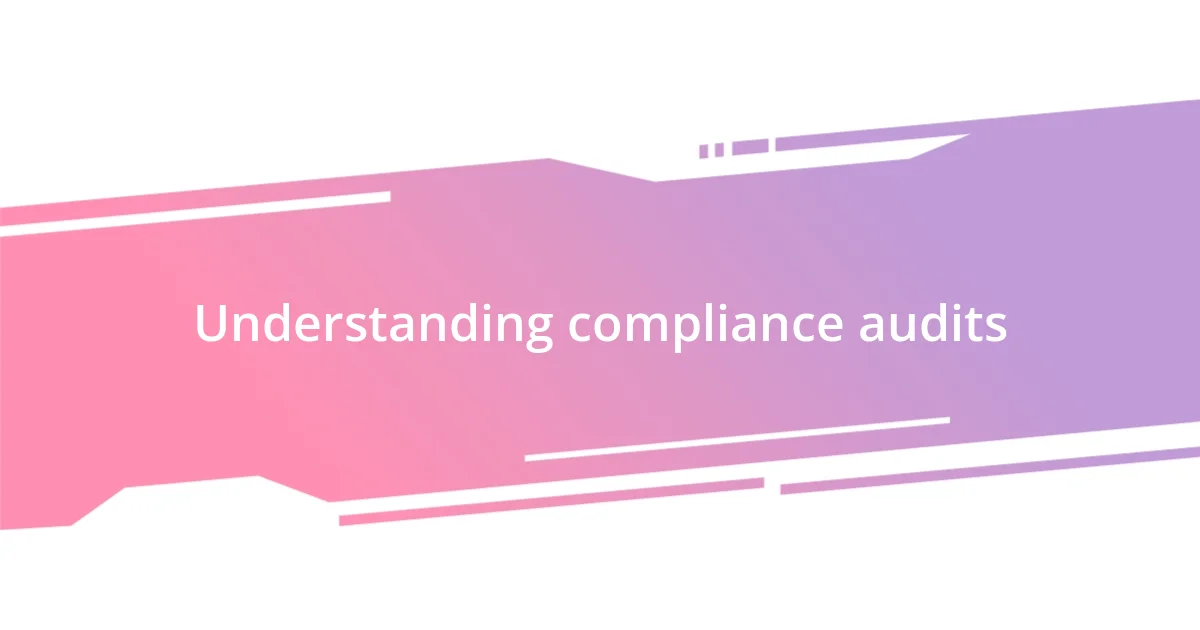
Understanding compliance audits
Compliance audits can feel daunting, but I believe they serve a crucial purpose. They’re like a health check for organizations, assessing whether systems and policies align with regulations and standards. Every time I prepare for one, I remind myself that it’s not just about ticking boxes; it’s about fostering a culture of accountability.
I often think back to an audit I was part of early in my career. The initial stress was palpable—everyone seemed tense. However, as we dove deeper, I realized it was an opportunity to identify gaps in our processes and enhance our practices. It’s fascinating how such a thorough evaluation can transform fear into improvement, isn’t it?
When I reflect on what compliance audits entail, I see them as a roadmap to better practices. They reveal areas where organizations can strengthen their operations and mitigate risks. If we approach them with curiosity instead of anxiety, we can discover valuable insights that drive success—even if it involves digging into uncomfortable areas.
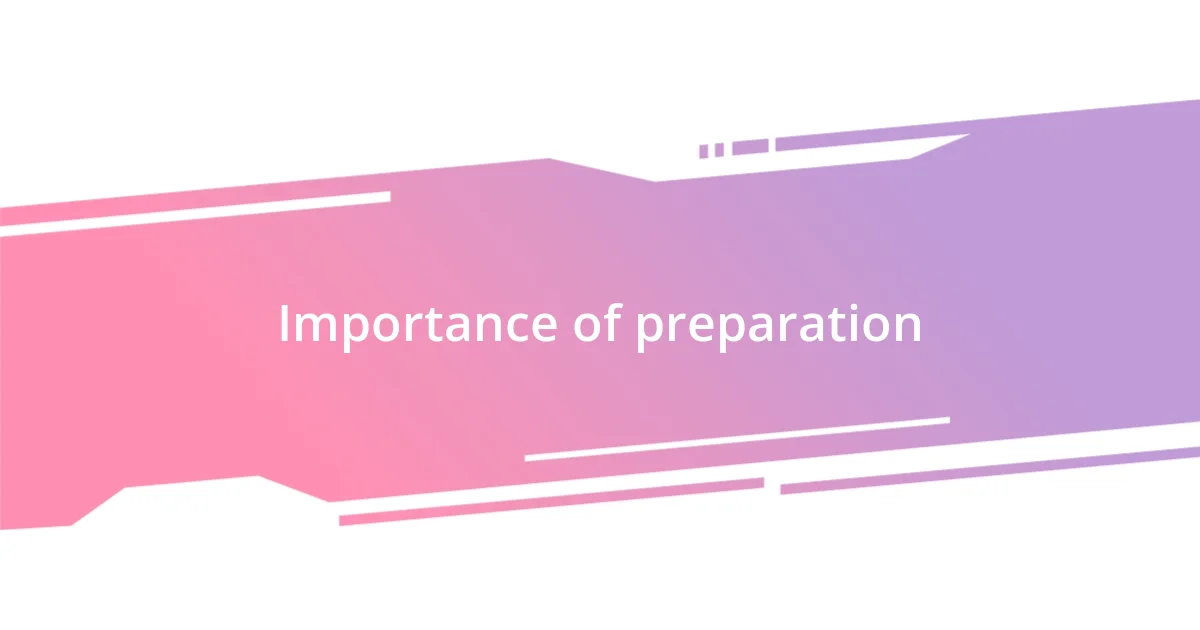
Importance of preparation
Preparation is the cornerstone of any successful compliance audit. I can’t emphasize enough how being well-prepared alleviates anxiety and builds confidence within the team. I recall a time when I spent a week organizing documentation and processes before the audit. That effort transformed our experience from a chaotic rush to a structured walkthrough, allowing us to showcase our commitment to compliance effectively.
I’ve learned that preparation not only streamlines the audit process, but it’s also an opportunity for self-reflection. I remember a specific incident when, while preparing, I stumbled upon outdated procedures that had slipped through the cracks. Taking the time to ensure everything was up-to-date not only improved our compliance standing but also boosted team morale, knowing we were working with the best practices in mind.
Moreover, being thorough in preparation opens the door to constructive discussions during the audit, allowing the audit team to understand our specific context better. I vividly remember engaging with auditors who appreciated our efforts, prompting meaningful dialogues that went beyond mere regulatory compliance. It felt like a collaborative effort rather than a checklist, turning the experience into a learning opportunity for everyone involved.
| Aspect | Importance of Preparation |
|---|---|
| Confidence | Being well-prepared builds confidence, reducing anxiety during audits. |
| Self-Reflection | Preparation highlights areas that need improvement, fostering a proactive approach. |
| Collaboration | Thorough preparation encourages constructive discussions with auditors, enhancing understanding. |
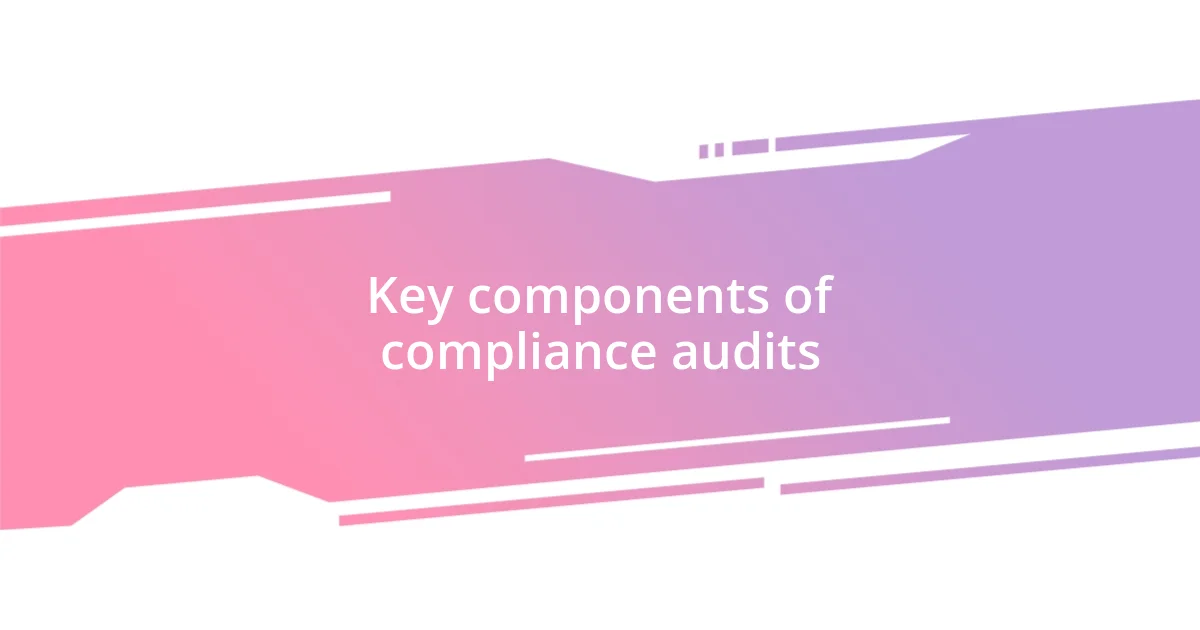
Key components of compliance audits
When I think about the key components of compliance audits, I realize several critical elements consistently emerge. Each aspect plays a vital role in ensuring that the audit serves its purpose effectively. For instance, I remember my first compliance audit when the importance of clearly defined scope hit me. It became apparent that knowing exactly what we were being audited for allowed us to focus our efforts and make the whole process smoother and more efficient.
Here are some essential components:
- Defined Scope and Objectives: Clearly mapping out what the audit will cover helps everyone stay aligned.
- Documentation Review: Gathering all relevant documents beforehand streamlines the process and sets a solid foundation.
- Risk Assessment: Identifying high-risk areas enables the audit team to focus on potential problem spots, enhancing overall effectiveness.
- Interviews and Discussions: Engaging team members during the audit fosters transparency and can uncover insights we might overlook.
- Follow-Up Actions: Documenting findings and establishing actions to address issues reveals a commitment to continual improvement.
Reflecting on how these components have shaped my experiences, I can’t help but appreciate the role of teamwork in compliance audits. One time, I was part of an audit where the auditors collaborated closely with our team at every stage. It felt like we were all in it together, combining our knowledge to highlight strengths and address weaknesses. This cooperative spirit not only made the audit more enjoyable but also led to actionable insights that improved our compliance framework significantly.
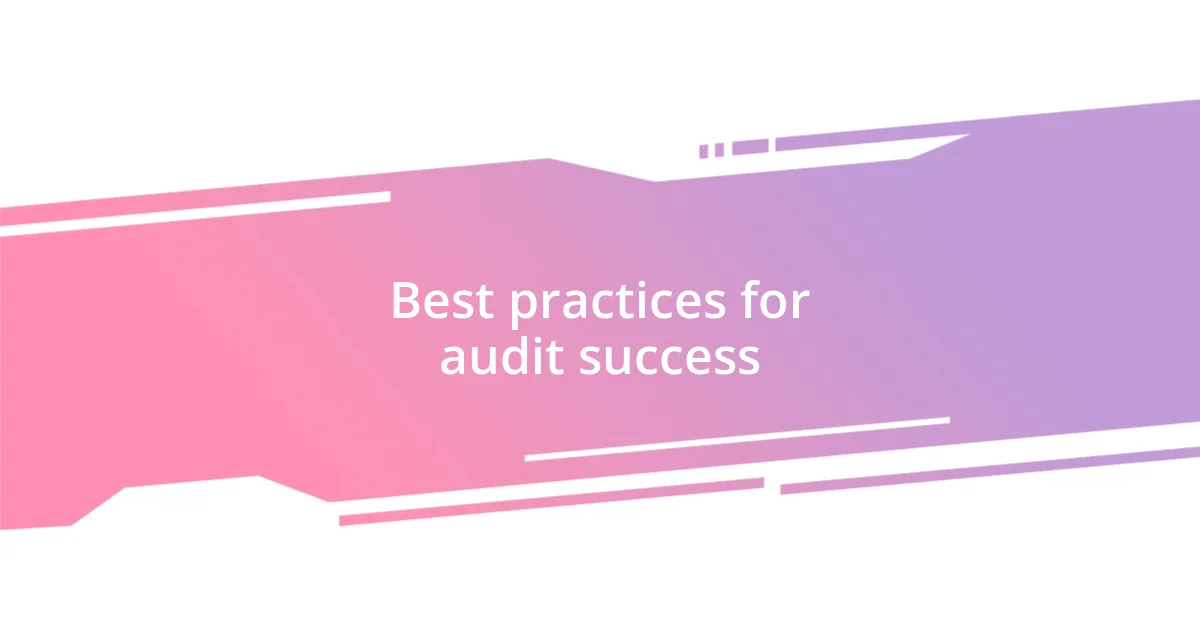
Best practices for audit success
Establishing a culture of openness is crucial for audit success. I remember a time when our team adopted this approach, encouraging everyone to voice concerns or ask questions without hesitation. It transformed our audit into a positive learning environment rather than a daunting evaluation. Can you imagine how much easier it is to identify issues when everyone feels comfortable sharing? This collective honesty not only aids in compliance but also fosters a sense of camaraderie among team members.
I’ve found that continuous training for employees plays a significant role in preparedness. One company I worked with invested in regular compliance workshops, which kept everyone informed and engaged. This practice not only helped us stay updated on ever-evolving regulations but also instilled a sense of ownership amongst the team. How empowering does it feel to be equipped with the right knowledge? It was invigorating to see team members confidently addressing auditor questions, showcasing their understanding and commitment.
Lastly, embracing technology can enhance the audit process immensely. During one audit, we utilized software that tracked our compliance metrics in real-time. It felt like having a virtual assistant guiding us, ensuring we didn’t miss any critical detail. Isn’t it fascinating how technology can turn a seemingly overwhelming task into an organized experience? This approach not only simplified the process but also opened pathways for innovation, making our audit journey that much smoother and more efficient.
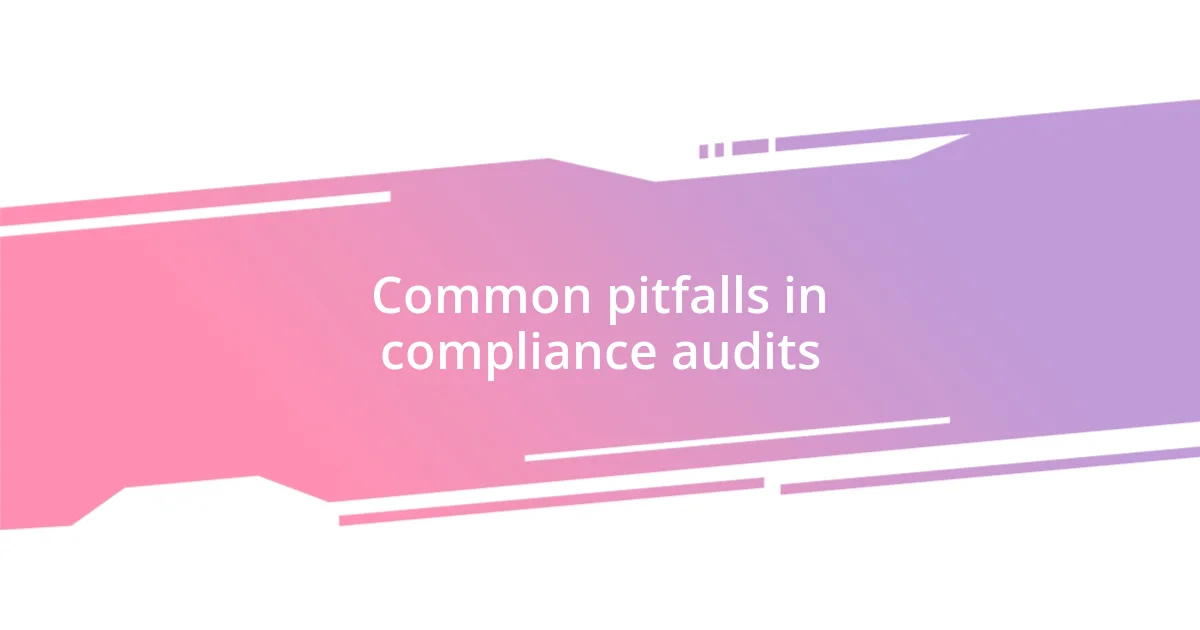
Common pitfalls in compliance audits
One of the most common pitfalls I’ve seen in compliance audits is the lack of proper documentation. There was a time when my team was caught off guard, scrambling to find essential records at the last minute. It felt incredibly stressful, and I learned firsthand how critical it is to have documents ready ahead of time. Imagine how much smoother the audit would have been had we taken the time to organize everything in advance!
Another mistake I’ve noticed is underestimating the importance of communication during the audit process. I recall an audit where the auditors and our team barely interacted, leading to misunderstandings that could have easily been avoided. Can you imagine the tension in the room? Open channels for dialogue foster transparency, allowing for clarifications that can significantly enhance the audit outcome. It’s a simple step that can make a world of difference.
Finally, one frequent stumbling block is failing to follow up on the findings post-audit. I remember a situation where an audit revealed several critical issues, but we didn’t address them promptly. It was disheartening to realize that we had missed a chance for meaningful improvements. How can we genuinely commit to compliance if we don’t actively implement the changes needed? Following up reinforces the value of the audit and shows a dedication to continuous improvement.
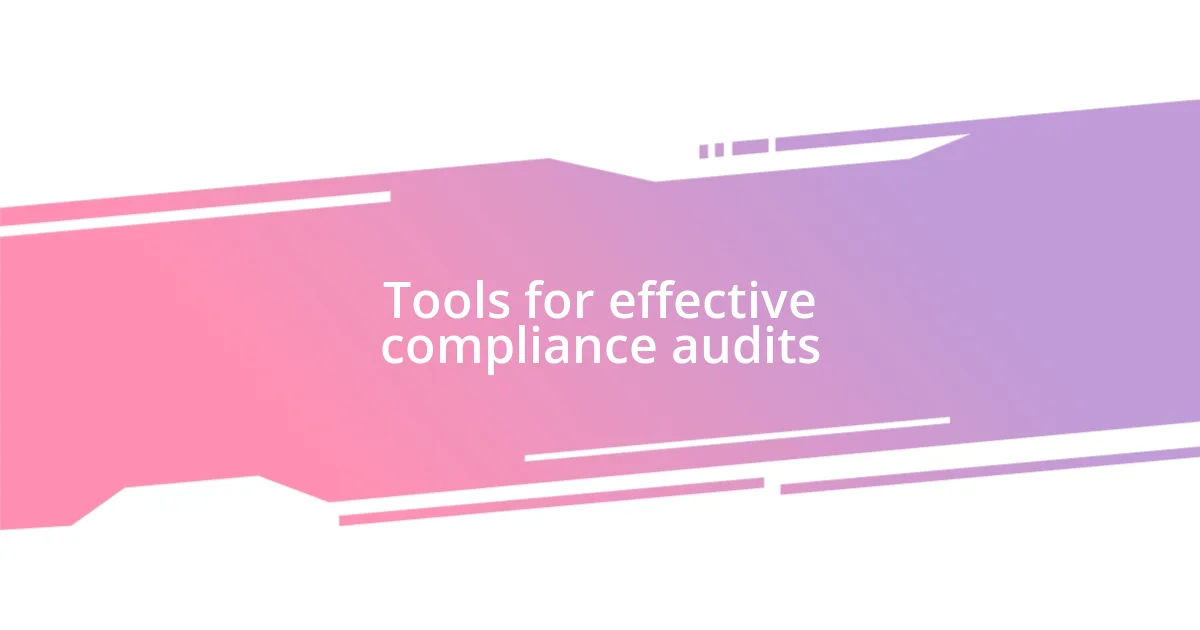
Tools for effective compliance audits
I’ve discovered that the right tools can make all the difference in conducting effective compliance audits. During an audit at a previous company, we implemented a cloud-based documentation system that allowed team members to access files instantly. This accessibility not only saved us precious time but also reduced the risk of misplacing crucial documents. Doesn’t it feel reassuring when everything you need is just a click away?
Also, using data analytics tools has been a game-changer in identifying compliance trends. I remember analyzing patterns from past audits, and it revealed some recurring issues we hadn’t noticed before. With this insight, we could proactively address these areas, turning potential pitfalls into growth opportunities. Can you imagine the satisfaction of being one step ahead, understanding your weaknesses before an auditor points them out?
Moreover, project management software has transformed how we coordinate audits. I recall feeling overwhelmed with task assignments in previous audits, but now we use platforms that monitor progress and deadlines collaboratively. This transparency not only lessens stress but also promotes accountability within the team. How empowering is it when everyone knows their role and deadlines are clearly outlined? The combination of these tools definitely creates a more organized and effective audit process.

Lessons learned from my experiences
I’ve learned that adaptability is crucial during compliance audits. There was a time when our plans fell apart due to unexpected regulatory changes. It was a wake-up call for me; I realized that being rigid in our approach could lead to chaos. Flexibility allowed us to pivot quickly, meaning we could still meet our objectives despite unforeseen challenges.
It’s also vital to cultivate a culture of accountability within the team. I vividly remember a situation where one team member dropped the ball on a critical task, and it affected the entire audit timeline. The disappointment was palpable, but it reinforced my belief that everyone should feel responsible for their role. I often ask myself, “What can we do to foster this sense of ownership?” Trust is the foundation; when each person knows their contributions matter, the entire process becomes more seamless.
Finally, I swear by the power of thorough pre-audit training. I once conducted a session for my team before an important audit, focusing on what to expect and how to prepare. The difference was remarkable – everyone was much more at ease, confident, and ready to face the auditors. Have you ever noticed how a little preparation can alleviate anxiety? For me, that experience underscored how investing time in training pays off tenfold during the audit itself.












